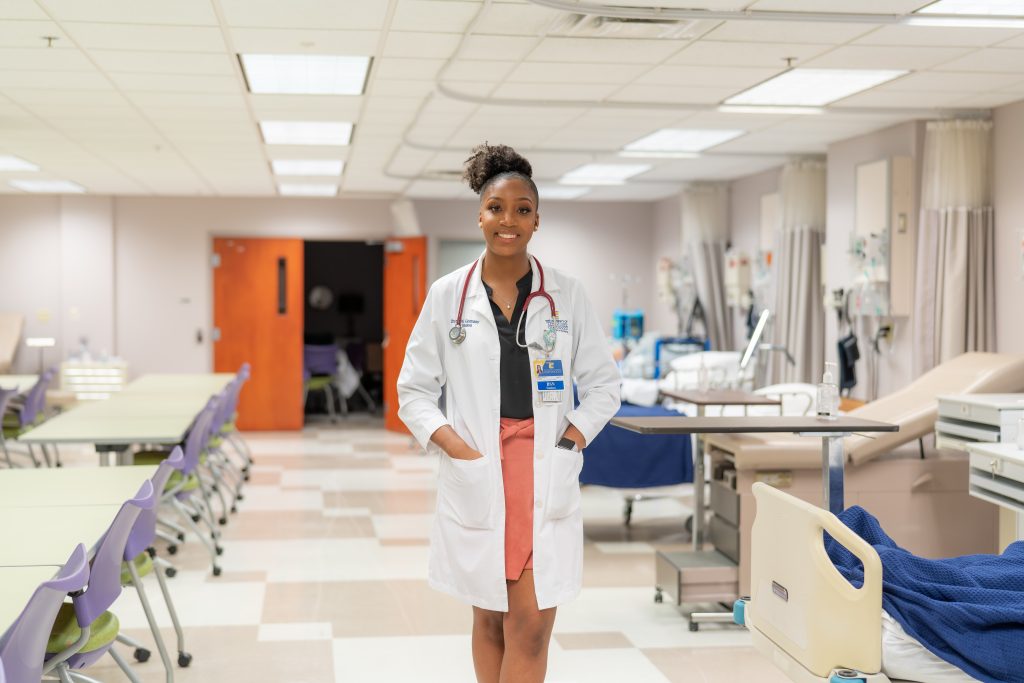Key Takeaways
- Each year, the BlueCross BlueShield of Tennessee Foundation awards $10,000 scholarships to minority students pursuing degrees in health care.
- The goal of these scholarships is to help reduce health disparities by improving diversity in the state’s health care workforce and combating systemic racism and injustice.
- Since 2013, the foundation has awarded $285,000 to students leading the charge.
- This year, the BlueCross Foundation will award 6 scholarships to students across the state.
When Chyna Germany was selected as a BlueCross Power of We Scholar in 2019, she was a sophomore nursing major at the University of Tennessee – Chattanooga with aspirations of becoming a nurse practitioner in obstetrics and gynecology.
“I have women in my family, including myself, who’ve been plagued by reproductive issues, and I was surprised to run into so many women who knew very little about their own health,” she said. “I want to help women understand what’s happening in their bodies.”
We caught up with Chyna to find out what she’s been up to since graduating and how the BlueCross Power of We Scholarship helped her along her career path.
Q: What was your first job in health care after graduating? Where do you work now?
Chyna: After graduating in May of 2021, I took a job as a labor and delivery nurse at Erlanger Baroness Hospital in Chattanooga. I have since moved to Seattle, WA, to work as a labor and delivery nurse at the University of Washington Medical Center – Montlake. I made the move to push myself out of my comfort zone so I could gain new perspectives and experiences outside of Tennessee, where I spent 22 years of my life.
Q: What populations do you work with? Are there any particular health challenges you see regularly?
Chyna: Both hospitals I’ve worked at are high-risk perinatal units, so we see a wide variety of pregnancy and pre-pregnancy related conditions that can complicate labor. These include diabetes outside of pregnancy, chronic hypertension, various maternal heart conditions, fetal growth anomalies, pre-eclampsia, gestational diabetes, and placental issues like previas and abruptions. We do see normal pregnancies and labors, too, but our unit is primarily focused on these high-risk populations.
Q: Are there any patient care stories that stand out to you?
Chyna: There are so many patient stories that I hold close to my heart and remind me why I chose to become a labor and delivery nurse, but a recent one comes to mind. People often have a limited view of what nurses do. I know this because I have so many friends and family members who think that labor and delivery is all about delivering babies and going about your day. However, our job encompasses so much more than that.
One of the things that drew me to nursing was the amount of time nurses spend with patients and the rapport they build. A huge part of our job is supporting the patient physically, mentally and emotionally, as birth stories aren’t always what families expect.
A recent patient delivered a baby with expected fetal anomalies and was stressed about its wellbeing. She also had additional stressors that made her experience more overwhelming. When I realized this, I put my focus into helping her feel totally supported while in my care.
When she opened up to me about her wishes, I advocated for her when she was too overwhelmed to tell others. I stayed close and got to know her and helped her feel like she wasn’t alone. When things weren’t going as she planned, I was able to talk her through it and reframe the situation in a more positive light. I used both my presence and words to help her through a difficult time, and when I left, she was smiling and laughing.
It’s moments like these that remind me how many hats nurses wear and how important our work is. And it’s stories like these that keep me going, even during the toughest days on my unit.
According to the Tennessee Department of Health:
- Black women in Tennessee are 3x as likely to die from pregnancy complications than white women
- Top causes of pregnancy-related deaths among Black women during 2017 and 2018 included heart disease, preeclampsia/eclampsia, embolism, infection and homicide
- 100% of pregnancy-related deaths of Black women were determined to be preventable
Q: Have you had the opportunity to effect change or give back to your community since graduating?
Chyna: Since graduating, I’ve become a resource for a few students currently in the UTC nursing program. I check in with them through texts, calls or even Instagram to see how classes are going, ask if they need help, and provide encouragement to keep them working hard and doing their best.
As far as plans to give back to my community in the future, I have recently been considering starting a mentorship program for minority nurses in various stages of their career, including students. I’d like to include nurses from various backgrounds to create a supportive network in which they can connect and find assistance with job and school applications, financial support for school and job relocation, and advice and encouragement as we all learn and further our careers. It’s often difficult and very different from what is taught in school, especially for those who look like me.
I’d also like to create an Instagram account dedicated to nursing, using my journey to help others by being honest and providing tips, advice and encouraging messages. While I realize this will take some time as I’m new to the field and am learning so much myself, I think it’s very important for me give back this way because I wouldn’t be where I am without the mentors, family members and friends who have supported me throughout my journey.

Q: How did the BlueCross Power of We Scholarship help you be successful as you finished your education and began your career?
Chyna: The BlueCross Power of We Scholarship allowed me to focus solely on school and continue to make straight As. I typically worked during the school year, which proved to get more and more challenging as I went further into my major. The scholarship helped me not only be able to pay for the school year, but it also assisted me in getting books and other resources that I needed. It also allowed me to graduate with very minimal student loans.
I will forever be thankful to BlueCross BlueShield of Tennessee and the National Association of Health Services Executives – Memphis Chapter for selecting me as a 2019 recipient of the scholarship.
Q: What advice would you give to current students who are interested in working in health care?
Chyna: My advice for anyone interested in health care is to figure out why you’re choosing the field. Any job in health care, especially now with COVID, can be very stressful and demanding mentally, emotionally and physically. Even I have days where I have to take a step back and remember why I love and chose my job as a labor and delivery nurse. Sometimes my patients serve as that reminder.
I believe once you really figure out your “why” and allow yourself to be reminded of that, nothing can take away your passion, and you will find that you strive to be the best version of yourself every day, serving and being a light for those who need you.
The BlueCross BlueShield of Tennessee Foundation is accepting applications for the BlueCross Power of We Scholarship through Friday, March 11.


 Amanda joined the BlueCross BlueShield of Tennessee corporate communications team in 2017. Born and raised in Chattanooga, she has a decade of experience in writing for print and the web, as well as digital marketing.
Amanda joined the BlueCross BlueShield of Tennessee corporate communications team in 2017. Born and raised in Chattanooga, she has a decade of experience in writing for print and the web, as well as digital marketing.